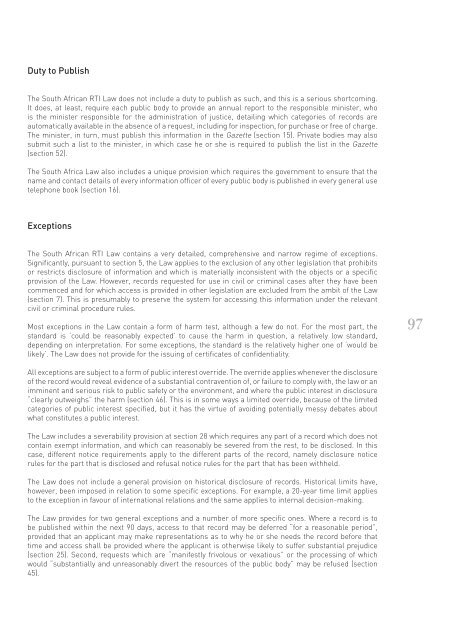Freedom of Information: A Comparative Legal Survey - Federation of ...
Freedom of Information: A Comparative Legal Survey - Federation of ...
Freedom of Information: A Comparative Legal Survey - Federation of ...
Create successful ePaper yourself
Turn your PDF publications into a flip-book with our unique Google optimized e-Paper software.
Duty to Publish<br />
The South African RTI Law does not include a duty to publish as such, and this is a serious shortcoming.<br />
It does, at least, require each public body to provide an annual report to the responsible minister, who<br />
is the minister responsible for the administration <strong>of</strong> justice, detailing which categories <strong>of</strong> records are<br />
automatically available in the absence <strong>of</strong> a request, including for inspection, for purchase or free <strong>of</strong> charge.<br />
The minister, in turn, must publish this information in the Gazette (section 15). Private bodies may also<br />
submit such a list to the minister, in which case he or she is required to publish the list in the Gazette<br />
(section 52).<br />
The South Africa Law also includes a unique provision which requires the government to ensure that the<br />
name and contact details <strong>of</strong> every information <strong>of</strong>fi cer <strong>of</strong> every public body is published in every general use<br />
telephone book (section 16).<br />
Exceptions<br />
The South African RTI Law contains a very detailed, comprehensive and narrow regime <strong>of</strong> exceptions.<br />
Signifi cantly, pursuant to section 5, the Law applies to the exclusion <strong>of</strong> any other legislation that prohibits<br />
or restricts disclosure <strong>of</strong> information and which is materially inconsistent with the objects or a specifi c<br />
provision <strong>of</strong> the Law. However, records requested for use in civil or criminal cases after they have been<br />
commenced and for which access is provided in other legislation are excluded from the ambit <strong>of</strong> the Law<br />
(section 7). This is presumably to preserve the system for accessing this information under the relevant<br />
civil or criminal procedure rules.<br />
Most exceptions in the Law contain a form <strong>of</strong> harm test, although a few do not. For the most part, the<br />
standard is ‘could be reasonably expected’ to cause the harm in question, a relatively low standard,<br />
depending on interpretation. For some exceptions, the standard is the relatively higher one <strong>of</strong> ‘would be<br />
likely’. The Law does not provide for the issuing <strong>of</strong> certifi cates <strong>of</strong> confi dentiality.<br />
All exceptions are subject to a form <strong>of</strong> public interest override. The override applies whenever the disclosure<br />
<strong>of</strong> the record would reveal evidence <strong>of</strong> a substantial contravention <strong>of</strong>, or failure to comply with, the law or an<br />
imminent and serious risk to public safety or the environment, and where the public interest in disclosure<br />
“clearly outweighs” the harm (section 46). This is in some ways a limited override, because <strong>of</strong> the limited<br />
categories <strong>of</strong> public interest specifi ed, but it has the virtue <strong>of</strong> avoiding potentially messy debates about<br />
what constitutes a public interest.<br />
The Law includes a severability provision at section 28 which requires any part <strong>of</strong> a record which does not<br />
contain exempt information, and which can reasonably be severed from the rest, to be disclosed. In this<br />
case, different notice requirements apply to the different parts <strong>of</strong> the record, namely disclosure notice<br />
rules for the part that is disclosed and refusal notice rules for the part that has been withheld.<br />
The Law does not include a general provision on historical disclosure <strong>of</strong> records. Historical limits have,<br />
however, been imposed in relation to some specifi c exceptions. For example, a 20-year time limit applies<br />
to the exception in favour <strong>of</strong> international relations and the same applies to internal decision-making.<br />
The Law provides for two general exceptions and a number <strong>of</strong> more specifi c ones. Where a record is to<br />
be published within the next 90 days, access to that record may be deferred “for a reasonable period”,<br />
provided that an applicant may make representations as to why he or she needs the record before that<br />
time and access shall be provided where the applicant is otherwise likely to suffer substantial prejudice<br />
(section 25). Second, requests which are “manifestly frivolous or vexatious” or the processing <strong>of</strong> which<br />
would “substantially and unreasonably divert the resources <strong>of</strong> the public body” may be refused (section<br />
45).<br />
97
















